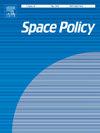Developing safety-zone rules: Based on an institutional choice framework
IF 1.9
4区 社会学
Q2 INTERNATIONAL RELATIONS
引用次数: 0
Abstract
Under Section 11 of the Artemis Accords, signatories propose the establishment of safety zones to prevent harmful interference and emphasise the imperative to develop relevant rules in the future. However, existing research fails to shed light on whether the chosen institutions by signatories are suitable for addressing safety-zone issues and which institutions should be developed to tackle future safety-zone concerns. Current theories, such as institutional design theory, do not comprehensively summarise the various types of institutions and strategies for their selection. Therefore, this paper presents an institutional choice framework to address these research gaps. Within this research framework, establishing international institutions is perceived as a selection process among different types of institutions. Drawing from previous studies, the framework outlines sixteen distinct institution types, six crucial features of institutions, and three strategies for selecting suitable institutions. After proposing the framework, this study employs it to analyse existing safety-zone rules, identify the optimal institution of safety zones, and devise strategies for making institutional choices. The contribution of this study lies in advancing institutional design theory and facilitating research on safety-zone rules while providing insights for constructing international institutions in other domains.
制定安全区规则:基于制度选择框架
根据《阿耳忒弥斯协定》第11节,签署国提议建立安全区,以防止有害干扰,并强调今后必须制定相关规则。然而,现有的研究未能阐明签署国选择的机构是否适合解决安全区问题,以及应该发展哪些机构来解决未来的安全区问题。目前的理论,如制度设计理论,并没有全面总结各种类型的制度及其选择策略。因此,本文提出了一个制度选择框架来解决这些研究空白。在这一研究框架内,建立国际机构被认为是在不同类型的机构之间进行选择的过程。根据以往的研究,该框架概述了16种不同的制度类型,制度的六个关键特征,以及选择合适制度的三种策略。在提出该框架后,本文运用该框架分析了现有的安全区域规则,确定了安全区域的最优制度,并设计了制度选择的策略。本研究的贡献在于推进了制度设计理论,促进了安全区域规则的研究,同时也为其他领域的国际制度建设提供了借鉴。
本文章由计算机程序翻译,如有差异,请以英文原文为准。
求助全文
约1分钟内获得全文
求助全文
来源期刊

Space Policy
Multiple-
CiteScore
3.40
自引率
36.40%
发文量
40
期刊介绍:
Space Policy is an international, interdisciplinary journal which draws on the fields of international relations, economics, history, aerospace studies, security studies, development studies, political science and ethics to provide discussion and analysis of space activities in their political, economic, industrial, legal, cultural and social contexts. Alongside full-length papers, which are subject to a double-blind peer review system, the journal publishes opinion pieces, case studies and short reports and, in so doing, it aims to provide a forum for the exchange of ideas and opinions and a means by which authors can alert policy makers and international organizations to their views. Space Policy is also a journal of record, reproducing, in whole or part, official documents such as treaties, space agency plans or government reports relevant to the space community. Views expressed in the journal are not necessarily those of the editors or members of the editorial board.
 求助内容:
求助内容: 应助结果提醒方式:
应助结果提醒方式:


